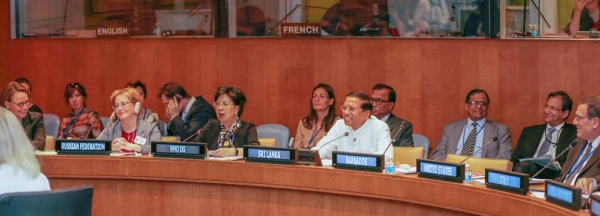
Director General of the World Health Organsiation Dr. Margaret Chan commended the efforts made by the President Maithripala Sirisena in his capacity as the former Minister of Health in advancing the health sector in Sri Lanka. The Director General made these remarks at a side –event on Non – Communicable Diseases (NCDs) which was attended by President Sirisena on the side – lines of his visit to the 71st Session of the United Nations General Assembly on 22nd September 2016.
The event which was co –hosted by the Government of Russia and the World Health Organisation(WHO) launched the Friends of the United –Nations Inter – Agency Task Force on prevention and control of NCDs initiative and provided an overview of the current work of the Task Force, showcasing action at country level, discuss on supporting Member States to achieve the NCD-related Sustainable Development Goals, and outlining a number of global joint programmes that now require funding in order to become operational.
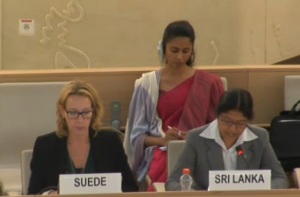
Sri Lanka as the current Chair of the Asia-Pacific Forum on Sustainable Development, is committed to see expedited transformation into sustainable development. In our own country, a National Sustainable Development Act in conformity with the SDGs is scheduled to be tabled in the Parliament soon. The objective of this new Act is to formulate a National Policy and Strategy on Sustainable Development and to provide the necessary legal and institutional framework for developing and implementing it.
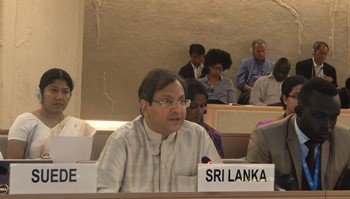
Please find attached the full statement of the Government of Sri Lanka delivered by Ambassador Ravinatha Aryasinha, Sri Lanka's Permanent Representative to the UN in Geneva and the Leader of the Sri Lanka Delegation to the 33rd Session of the Human Rights Council.
This Statement was made during the Clustered Interactive Dialogue with the Working Group on Enforced or Involuntary Disappearances (WGEID) held today (15 September 2016) following, the statement by the Chair Rapporteur of the Working Group presenting the report on its visit to Sri Lanka from 9 – 18 November 2015.
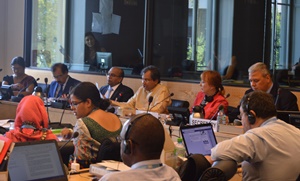
Consideration of the Second Periodic Report of Sri Lanka under the Committee on Migrant Workers (CMW) took place at the 25th Session of the Committee on Migrant Workers, held at the Palais Wilson in Geneva, today (1 September 2016). Ambassador Ravinatha Aryasinha, Permanent Representative of Sri Lanka to the UN in Geneva and Leader of the Sri Lanka delegation introduced the report.
The Sri Lanka delegation to the review included Mr. G.S. Witanage, Secretary, Ministry of Foreign Employment, Mr. C.A.H.M. Wijeratne, Senior Director General (Legal), Ministry of Foreign Affairs, Mrs. Samantha Jayasuriya, Deputy Permanent Representative Sri Lanka , Mr. W.M.V. Wanasekara, Additional General Manager, Sri Lanka Foreign Employment Bureau, Mr. Gamini Rathnayake, Director, Sri Lanka Foreign Employment Bureau, Ms. Dilini Gunasekera, Second Secretary, Ms. M.L.F. Mafusa, Second Secretary, Permanent Mission of Sri Lanka and Mrs. Sarasi De Silva, Attaché/Documentation & Research of the Permanent Mission of Sri Lanka.
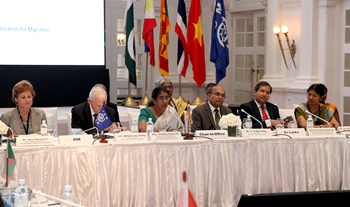
The Fifth Ministerial Consultations of the Colombo Process (CP) has decided to explore cooperation in the operationalization of the migration related goals in the SDGs, work towards promoting the health of migrant workers throughout the migration cycle, to focus on consular support for migrant workers and to promote equality for women migrant workers.

Sri Lanka's Permanent Representative to the UN in Geneva and Chair of the Geneva-based Colombo Process Member States Ambassador Ravinatha Aryasinha presenting a report of the Fourth Senior Officials’ Meeting of the Colombo Process Colombo, Sri Lanka, on 24 August 2016 has detailed the tangible achievements of Sri Lanka's Chairmanship of the Colombo Process over the past 3 years.


For the first time, two Sri Lankan undergraduate students participated in the 2016 Summer Student Programme at the European Organization for Nuclear Research (CERN) in Geneva, the most prominent particle physics research institute in the world. Mr. Gamage Gihan Lakmal, a graduate from the Faculty of Science of the University of Ruhuna and Mr. Malinda Shiram de Silva, a final year undergraduate from the Faculty of Science of the University of Colombo, completed their two month programme last week. The Sri Lankan students were selected on merit by CERN, following a funding arrangement negotiated by the Permanent Mission, where CERN provides financial assistance for one student and the Government of Sri Lanka (GoSL) funds the other student.
